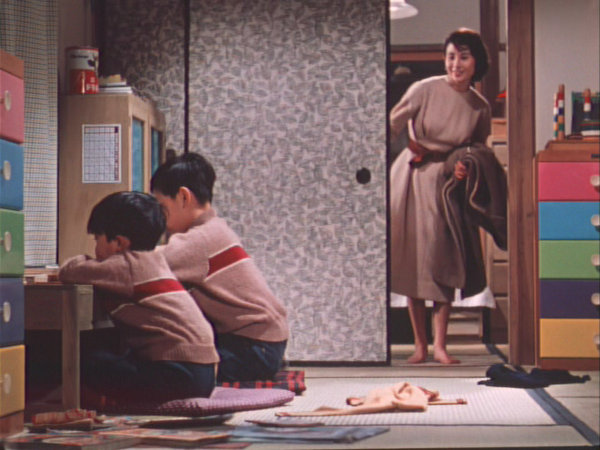
Good Morning (Yasujirō Ozu, 1959). I’ll admit to being underexposed to the work of the revered Japanese director Yasujirō Ozu. (It’s not a good excuse, by any means, but I’ve devoted most of my relevant geographically-based cinema self-schooling to films of Ozu’s countryman Akira Kurosawa.) And because my primary connection to Ozu’s oeuvre is through the masterful Tokyo Story, I think of the filmmaker as a crafter of delicate, relatively sedate art. As that preamble suggests, Good Morning proves how wrong I was in my reductive assumption. A loose remake of a film Ozu made over twenty-five years earlier, Good Morning largely concerns a couple of young brothers operating with escalating bratty behavior in an attempt to bully their parents into purchasing a television set. Around that, Ozu expertly stages a subplot that shows how animosity and suspicion move with stealthy passive aggressiveness throughout a tight-knit community. Ozu’s film is bright, cunning, and delightfully rambunctious. It’s also beautifully structured in every way, including unfussy perfection in the staging of shots and depth of psychological understanding of all the characters that evidences warmth and wry judgment all at once.

The Big Sky (Howard Hawks, 1952). This Western centers on a group of ramshackle fellows who race against a menacing trading company to form an agreement with the Blackfoot tribe in the commerce of the day. Along the way, Jim Deakins (Kirk Douglas) and Boone Caudill (Dewey Martin) find themselves in a bit of a love triangle with a Native American woman named Teal Eye (Elizabeth Threatt). The story isn’t always compelling, but Howard Hawks, as usual, builds the film with personality spilling out of its sprocket holes. It’s especially entertaining to see him bring a bleak humor to the depiction of the physical horrors that routinely befell those who took it upon themselves to tame the frontier. Arthur Hunnicutt received an Academy Award nomination for his role as the cynical hand who provides a moral compass, albeit one with a slightly bent pointer. It was a deserving nod; Hunnicutt’s performance is the highlight of the film.

The Witness (James Solomon, 2015). Increasingly, I find it likely that Ezra Edelman’s terrific O.J.: Made in America points to the future of documentary filmmaking, if only because so many features seem to be straining for the same exhaustive examination of interconnected concerns. Director James Solomon covers an immense amount of sociological and deeply personal sub-topics in The Witness, but must largely settle for doing so in a glancing fashion, finishing with a film that is both impressively ambitious and mildly dissatisfying. First and foremost, the film is about the murder of Kitty Genovese, an occurrence infamous more for the documented indifference of her New York City neighbors to her cries for help than the street-side crime itself. As Solomon painstakingly shows, the circumstances of Genovese’s death have become emblematic of social apathy, used as a metaphorical tool to make points about everything from day-to-day small town lawbreaking to the devastation delivered against the city of Aleppo. But Genovese was more than a social studies lesson. She was a person, and she left behind a heartbroken family. One of those family members, her brother William Genovese, is the heart of the documentary as he obsessively seeks understanding and closure. (The latter goal contributes to the film’s one flat-out terrible stretch, a sequence in which William hires an actress to recreate Kitty’s screams on the street where she was killed, an inexplicable gesture that Solomon treats as so logical it requires no further exploration.) Solomon has an immense amount to say with his film — some of it powerful, some of it challenging, much of it deeply insightful. In the end, more than anything else, I wish he’d had more time to say it.
Discover more from Coffee for Two
Subscribe to get the latest posts to your email.